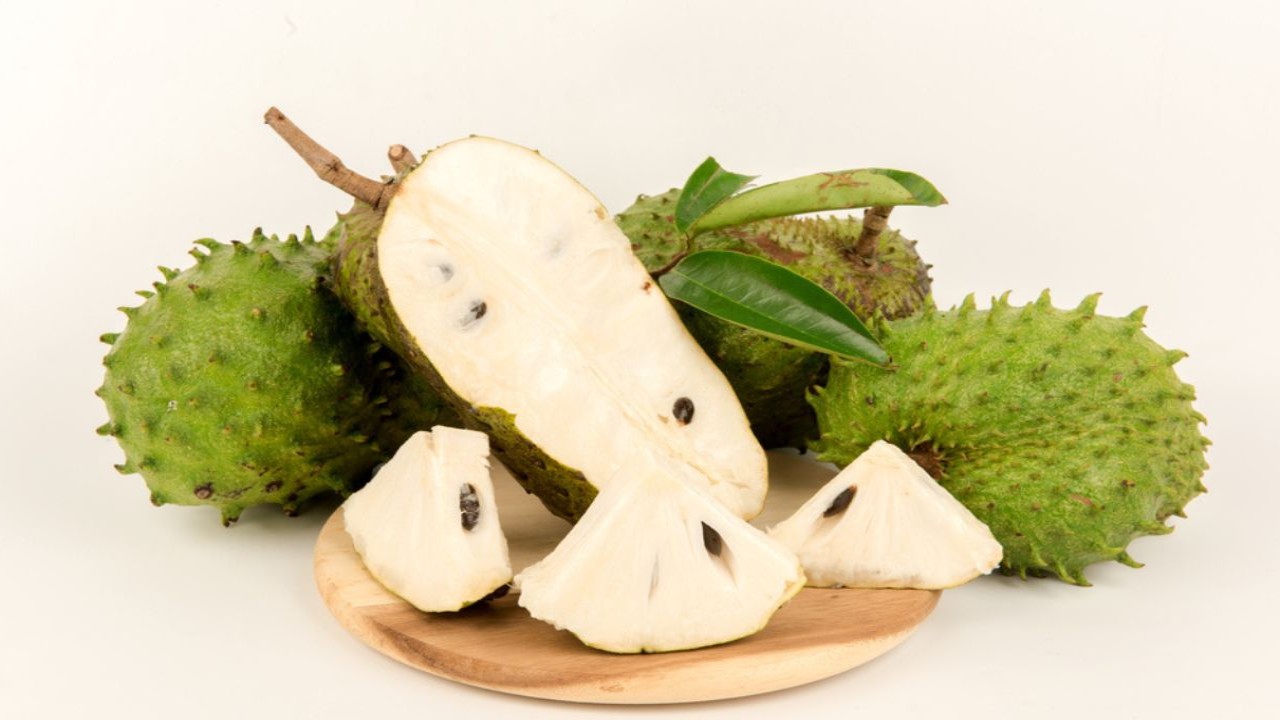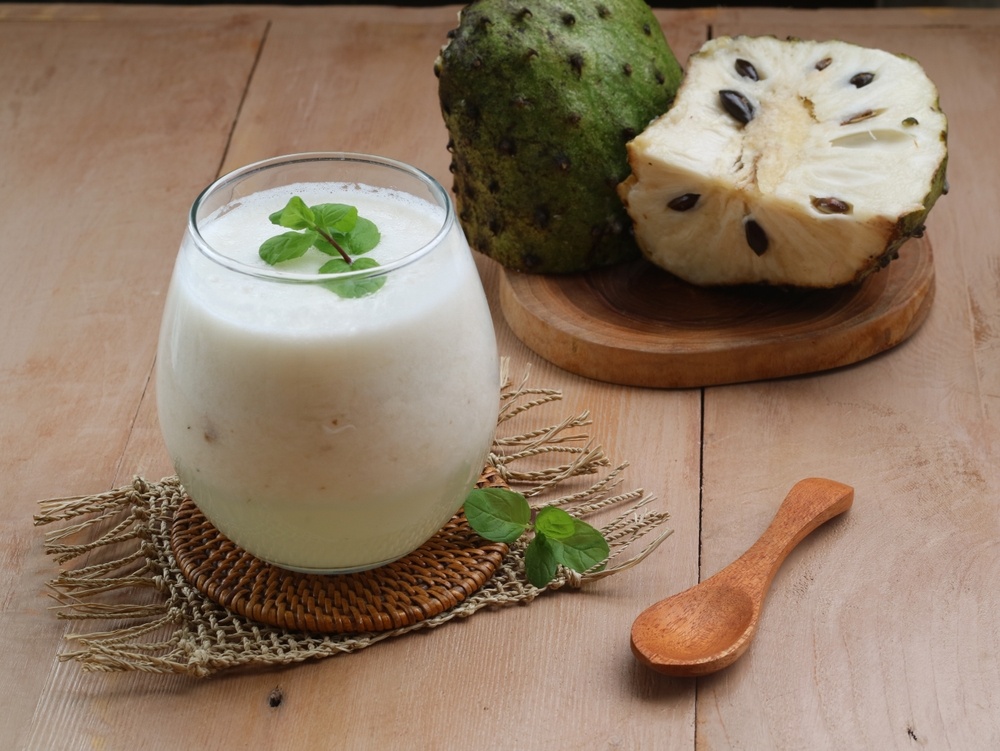Benefits of Soursop (Graviola) And Healthy Ways to Consume Them
Traditionally, soursop has been used for a variety of medical ailments. Here, discover the benefits of soursop and explore healthy ways to consume this tropical fruit.

The impressive benefits of soursop make it one of the most popular tropical fruits. This tropical fruit not only tantalizes your taste buds with its unique creamy flavor but also packs a punch when it comes to boosting your health. From its rich nutritional profile to its potential anti-inflammatory and antioxidant properties, soursop has a lot to offer. According to RDN Kimberly Gomer, Director of Nutrition at Body Beautiful, Miami, “All tropical fruits as a group are filled with nutrients that may help with controlling blood pressure, ensuring proper digestion, and possibly even lowering the risk of cancer and heart disease. Tropical fruits contain protein-digesting enzymes that help reduce inflammation in the body.
It is important to note that one food is not going to solve all problems alone. A person’s entire diet and lifestyle (including sleep, stress management, and exercise) along with their individual health profile need to be considered when looking at adding anything (including tropical fruits) to improve health. Most people love fruit and tropical fruits can be a delicious and nutritious addition to a person’s diet.”
The real trick however, is knowing how to select the right fruits and ways to enjoy them. So, get ready to discover why this prickly green fruit is worth adding to your diet and how to consume them.
What is Soursop?
Soursop, also known as guanabana fruit or Graviola, is a fruit that belongs to the custard apple family. This spiky green fruit has a creamy texture and a bold flavor. You can simply slice it in half and scoop out the juicy flesh and have them. It not only treats your taste buds but also comes with impressive health benefits. It is high in vitamins and fiber as well as low in fat.
Soursop originally hails from the tropical regions of America and the Caribbean region. It typically thrives in high humidity and warm winters. The various parts of the plant, including the leaves, fruit, and stems, are also utilized for medicinal purposes.
Not only that, soursop finds its way into the culinary world, where it adds a special touch to dishes. And if that wasn't enough, this versatile fruit can even be used for hair and skin benefits.
Soursop Nutrition Value
Similar to many other fruits, soursop is a nutritious powerhouse. It provides a range of dietary fiber, vitamins, and minerals. Here's a breakdown of the nutritional content found in 100 grams of soursop (1):
- Energy: 276 kJ
- Protein: 1 gram
- Carbohydrates: 16.8 grams
- Dietary fiber: 3.3 grams
- Sugars: 13.5 grams
- Fat: 0.3 grams
In addition to its fiber content, soursop is packed with essential vitamins and nutrients like:
- Vitamin C
- Vitamin B complex
- Niacin
- Thiamine
- Riboflavin
- Folate
- Pantothenic acid
- Vitamin B6
- Potassium
- Magnesium
- Phosphorus
- Iron
One notable feature of soursop is its high antioxidant content. Antioxidants are crucial substances that help protect cells from damage caused by harmful free radicals (2). Our contributor Kelsey Costa, MS, RDN and nutrition research specialist, shares the important nutritional facts about Soursop. She says, “Soursop, or graviola, is a fruit teeming with essential nutrients, like vitamin C and potassium.”
Health Benefits of Soursop
Soursop offers a multitude of health benefits. Traditionally, the fruit, stem, and leaves of soursop have been used to treat a wide range of diseases. Let's delve deeper into the benefits of soursop.
1. Antioxidants: Soursop is a rich source of antioxidants, including flavonoids, and phenols. These compounds help neutralize harmful free radicals. By doing so, they shield your precious cells from oxidative damage and lower the chances of dealing with serious health issues like heart disease and certain types of cancer (2). They also have bioactive substances like acetogenins which also enhance the antioxidant capacity (3).
2. Anti-inflammatory Properties: The anti-inflammatory compounds found in soursop can help alleviate inflammation throughout the body. Chronic inflammation may also be linked to various health issues, like cardiovascular disease (4).
This could also be a game-changer in managing inflammatory conditions such as arthritis. In fact, there's evidence from an animal study that soursop extract actually lowered the levels of inflammatory markers associated with arthritis (5). Thus by incorporating soursop into your diet, you can potentially benefit from its natural anti-inflammatory effects.
3. Potential Anti-cancerous Properties: Soursop contains certain natural compounds, such as acetogenins, which have shown promising potential in laboratory studies as anticancer agents (6). These compounds are believed to inhibit the growth of cancer cells while leaving healthy cells unaffected. The soursop leaf extract has also been proven to have anti-cancer and anti-proliferative effects on breast cancer cell lines (7). However, more research is needed to fully understand their mechanisms and potential application.
Also, most of these studies involved high concentrations of soursop extract. So, while it's promising, we still need more research to see how eating the actual fruit can impact cancer in humans.
4. Helps with Digestion: Soursop is a good source of dietary fiber, which aids in digestion and promotes regular bowel movements. Adequate fiber intake supports a healthy digestive system, prevents constipation, and contributes to overall gut health by nourishing beneficial gut bacteria (8), (9).
5. Strengthens Immune System: The vitamin C content in soursop contributes to a robust immune system. Vitamin C enhances the production of white blood cells (neutrophils), which are vital for fighting off infections and bolstering immunity (10).
Their anti-cancerous properties also aid in enhancing the overall activity of the immune system (7). So one of the main benefits of soursop is to give your immune system a natural boost.
6. Stabilizes Blood Sugar Levels: Soursop may also help maintain stable blood sugar levels. The fruit contains dietary fiber, which slows down the absorption of sugars into the bloodstream, preventing sudden spikes and crashes in blood sugar (11).
Some research studies on rats showed that soursop has the potential to stabilize blood sugar levels and have anti-diabetic properties (12), (13). While we still need more research on humans to confirm these findings, it's exciting to think about this soursop benefit. This could be combined with a nutritious diet, regular exercise, and regular blood sugar monitoring for better results.
7. Antimicrobial Effect: Soursop has exhibited antibacterial properties in laboratory studies, showing effectiveness against certain types of bacteria (14).
It has been found to effectively eliminate various bacteria, including those responsible for tooth decay, gingivitis, and yeast infections. Its antimicrobial properties make it a potential natural remedy for these tooth issues (15).
Likewise, they also have antifungal and antiviral properties (16), (17).
8. Skin And Hair: Their powerful antibacterial and anti-inflammatory properties make soursop great for skin health. They are also known for their ability to soothe irritated skin. This property of soursop makes it a popular ingredient in baby cosmetics, providing a gentle and calming effect (18).
The acetogenin in soursop has been shown to be effective in eliminating head lice (19). Hence, the benefits of soursop for hair and skin health are also notable.
Now that we know the benefits, it's important to know how to consume them to fully enjoy their pros.
How to Eat Soursop?

When it comes to soursop, timing is everything. Most soursop is plucked from the tree before it reaches full ripeness. You can tell if it's mature by its color, which changes from green to a yellow-green shade. Give it a gentle press, and if it yields slightly, that's a good sign.
This soursop is a versatile ingredient used in various ways.
- Juices And Smoothies: You can just blend them to make refreshing juice or mix them with other fruits like pineapple, and mango for a great smoothie. Their creamy and slightly acidic flesh blends well with most other fruits.
- Ice creams: Just mix them with some condensed milk and heavy cream to make some sweet ice creams. You can also make homemade ice popsicles with them.
- Sorbets: Another famous delicacy is the guanabana (soursop) sorbet. You can mix the soursop extract with equal amounts of lemon juice and some sugar to make yummy sorbet.
- Confectioneries: The flesh of the fruit can also be utilized to add mild sweetness and creamy texture to baked goods.
- Soursop Tea: You can boil some dried or fresh soursop leaves to make a flavorful tea.
- Toppings: You can also finely chop the fruit and add it to your oatmeal, chia pudding, or cereal bowl.
While there are numerous ways to enjoy soursop, the most popular method is to consume it raw. To savor its goodness, simply cut it lengthwise, separate the flesh from the rind, and relish each juicy bite.
Also, be sure to keep away the soursop seeds. These seeds contain a substance called annonacin, which has been linked to a neurotoxin associated with the development of atypical Parkinson-like disease (20). Therefore, it's best to enjoy their creamy flesh and avoid consuming the seeds.
Side Effects of Soursop
While you may come across soursop extracts and teas for sale, it's important to be careful. These products are not regulated by the U.S. Food and Drug Administration (FDA), so you need to exercise some caution. Soursop can be toxic in large doses and can cause symptoms resembling those of Parkinson's disease, such as
- Personality changes
- Rigid muscles
- Slowness in movements
- Problems with eye movement
- Difficulties with gait and balance
This is because their seed contains a toxic compound called annonacin (a major acetogenin) which may lead to harmful side effects (20). Thus make sure to remove the seeds before enjoying the fruit to stay on the safe side.
Furthermore, the compounds found in extracts and teas may also interfere with medications, particularly those used for high blood pressure and diabetes treatments. Thus it is not worth experimenting with your health.
How to Pick and Store Soursop

When it comes to enjoying delicious and nutritious soursop fruits, knowing how to pick and store them properly is essential. This ensures we get the utmost benefits of soursop.
Skin Color: When it comes to choosing soursop, here's what you need to do. Start by examining the skin. Look for soursop with dark green skin, as a lighter shade indicates that it's still unripe.
Spines: Next, take a look at the fleshy spines on the fruit's exterior. Are there plenty of them? If so, that's a good sign of quality.
Blemishes: Now, give the soursop a quick scan for any blemishes or unsightly marks. If you notice too many bruises, it's best to find another one.
Pick to Your Need: If you're planning to consume the soursop immediately, go for one that feels soft to the touch. On the other hand, if you want to ripen it at home over a few days, choose a firmer one.
Refrigeration: Now, let's talk about storage. If you have an unripe soursop, you can store it at room temperature until it ripens. However, if you've got a juicy, ripe soursop, it's time for refrigeration. Pop it in the fridge, and it will stay fresh for about 48 hours once you bring it home.
So, remember these tips when selecting and storing your soursop, and you'll be able to enjoy its deliciousness at the perfect ripeness at all times.
Conclusion:
The benefits of soursop are numerous and diverse. From its potential anti-cancer properties to its ability to support digestion, and boost the immune system it offers a range of health advantages. Furthermore, soursop is not only nutritious but also delicious and versatile. By incorporating soursops into your meals and snacks, along with maintaining a balanced diet and healthy lifestyle, you can definitely harness its potential benefits.
Contributor: Kelsey Costa, MS, RDN, and Owner of Nutrition Insights LLC





 JOIN OUR WHATSAPP CHANNEL
JOIN OUR WHATSAPP CHANNEL














































